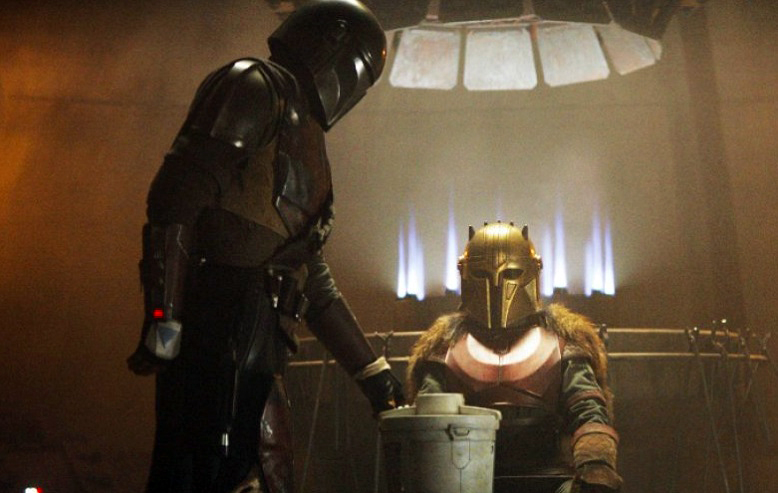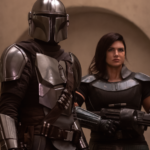
Chapter 3: The Sin" does precisely what this show needed. The first two episodes were an intriguing bit of minimalism, setting up a starkly intimate, borderline mellow contrast to the bombast of its big screen counterpart. The ponderous pacing and sparse dialogue combined with the dusty, backwater locales eased us into this neglected portion of the Star Wars universe, preparing us for something different. Now that that mission statement has been firmly established, The Mandalorian needed momentum. It needed escalation. How do you provide that?
In the words of the helmed warriors taking center stage in "Chapter 3": This is the way.
Directed by Deborah Chow, this episode doesn't take long to ramp things up. Despite, apparently, dozens of tracking fobs being handed out to every bounty hunter willing to take one, Mando (a nickname even characters in the show feel is too good to not use) was the only one capable of even coming close to bringing in the galaxy's most adorable bounty. He's rewarded handsomely with a cache of hoarded Beskar steel, the material used to fashion the traditional tribal armor in which Mandalorians perpetually clad themselves. But a fine reward of ceremonial (yet highly functional) armor isn't enough. As evidenced by his refusal to allow IG-11 terminate Yiddle (that's what we're all calling the Baby Yoda, right?), Mando has something of a heart. As the skillfully deployed flashbacks reveal, Mando as a child was a victim of the violence of war, and he'll be damned if he lets the rotting remnants of the Empire destroy the life of this child. So he does what any man with a code would do: Storm the hideout of these ex-Imperial thugs, rescue the Galaxy's Cutest Bounty, kick lots of ass while doing so and, theoretically, get away scott free. Things don't go quite that easily, but if you've yet to see the episode, let's just say that when forced to pick which code he's going to live by, Mando chose the right way.
It's a little surprising to admit, but "Chapter 3" is a bit jarring. The first half of the episode is a rapidly moving setup for a second half that's almost all action. After two ponderously paced preceding episodes, such a choice could have resulted in a bit of whiplash, but thankfully Chow pulls off the transition masterfully. She steadily ratchets up the tension from the moment Mando lands planetside and delivers to his client until the second all hell starts to break loose. That she does so while further advancing both our insight into Mando's past, as well as Mandalorian culture at large while never sacrificing the minimalist approach to either is no small feat.
Pedro Pascal continues to do a lot with very little, but it's the supporting characters that really get a chance to shine in this episode. It's always a delight to see Werner Herzog's sneering, venomous unnamed former Imperial (whatever he was, a Moff maybe?) show up again. But it's Carl Weathers who ends up as the MVP of the episode, burdened with delivering the closest thing we've had to exposition thus far in the show while toeing the line between friend and foe. I'm not sure I'd ever have pegged Weathers as a perfect fit for showing up in Star Wars but he's certainly earning his place.
As thrilling as the episode is, though, it mostly leaves me dying to know where this all leads. The Lone Wolf & Cub approach (as predicted in my previous review) seems even more certain, the real question now being how far they take it. With a legion of bounty hunters now certainly in pursuit (how fantastic was the scene in the bar where dozens of fobs light up at the same time?), the chase is on but what even remains as an option for our would-be hero? Does he plan on simply raising the youngling as his own? What does (what's left of) the Empire even want with this alien kiddo? But after this episode I've never been more confident that Jon Favreau and company are more than capable of answering all of that in a supremely engaging and entertaining way.
Some random episode thoughts …
— Deborah Chow isn't done with Star Wars after the two episodes of The Mandalorian she directed. She's been tapped to direct the Obi-Wan Kenobi TV show. Based on her work here, that show is in supremely capable hands.
— Much praise must be given to Ludwig Goransson's original score. So much of Star Wars' aural personality has been wrapped up in John Williams' compositions, but Goransson continually takes the music in a direction that is as interesting and exciting as it is divergent. It sounds far more akin to the work of Bill Conti and especially Ennio Morricone than John Williams, and yet he still manages to make it feel like it belongs to the identity of Star Wars.
— The Rocketeer fan in me got a huge grin from the somewhat sly homage Chow delivers at the tail end of the episode.











